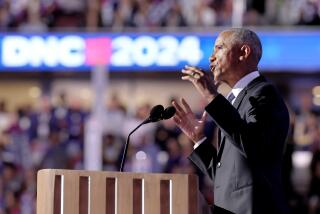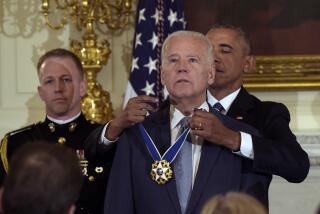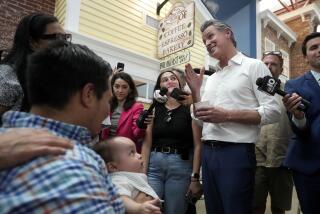Democrats use Obama campaign playbook while benching the president

Reporting from WASHINGTON — In tight Senate races across the country, Democrats are frantically trying to win over the prized mix of voters dubbed the Obama coalition. They just don’t want President Obama’s help.
Unpopular in many states whose voters will determine which party controls the Senate, Obama has been relegated to the role of silent partner. He is asked to raise money — and will do so Thursday in California — and to stay on message but to keep out of the close races.
------------
FOR THE RECORD
Oct. 15, 10:50 a.m.: An article in the Oct. 9 A section on President Obama’s dearth of campaign appearances this fall misspelled the name of Rep. Renee Ellmers of North Carolina as Rene Ellmers.
------------
It’s not an unusual demotion for second-term presidents, who are known to lose their electoral mojo by their sixth year. But in this case, the president on the sidelines wrote the playbook for modern campaigning, and one of his keys to success was cobbling together a coalition of voters including women, young people, blacks and Latinos.
The president’s status is laid bare in his recent travel, mostly to true-blue territory. Obama spent time last week in his hometown of Chicago and rubbed elbows with top-dollar donors in New York and Connecticut on Tuesday. On Thursday, he’ll hit up the Hollywood crowd for a fundraiser at Gwyneth Paltrow’s home in Los Angeles before heading to San Francisco on Friday.
Less than a month from election day, he has yet to appear onstage with a Democrat for a fall campaign event. He has not stumped for voters in North Carolina’s Senate race, although Obama in 2008 was the first Democrat win the state in 32 years. The president has not been to Colorado since July, another state he helped flip for Democrats. Even Iowa, where he began his road to the White House, has been off the calendar, not to mention Arkansas and Louisiana, two conservative states with closely contested campaigns.
“The irony is that a lot of these races, particularly in states like Arkansas, Louisiana, others, depend so much on African American turnout,” said David Axelrod, the president’s former senior advisor. “This is a place where the president could be very helpful. Those candidates are trying to figure out how to deploy him in some form or fashion, not necessarily in person. But they’ll deploy his voice and image in a targeted way.”
The White House says the president is happy to help Democrats however he can. The president and first lady have done their part with low-profile tactics that some strategists argue are more efficient and effective than large rallies. On African American radio and in mailers, Web videos and robocalls, Obama will close out the final weeks aiming to activate the universe of die-hard supporters who tend not to vote in midterm elections.
The president is also expected to step up travel to places where he is more welcome, particularly to such states as Pennsylvania, Wisconsin, Michigan and Illinois, which all have key governor’s races.
Some strategists say the president’s predicament is not merely a result of his lower approval rating. The lineup of Senate races this election cycle was daunting even before he lost popularity. Of the 24 states Obama lost in 2012, nearly 80% have Senate contests.
Although White House aides knew this terrain would be difficult, they acknowledge a frustration and an itchiness to get out on the trail. There’s a persistent nostalgia for the crowds and the pace of a campaign season, they say, and a belief it could be good for Democrats and the president if he were out of Washington more, working the crowds. But with world crises looming — particularly the war against Islamic State militants and the Ebola outbreak — a more practical approach has prevailed.
On Monday, when asked about the dearth of campaign appearances, White House Press Secretary Josh Earnest made only this mild prediction:
“The president has already succeeded in making a pretty aggressive case about why [his economic policies are] important for the country, and I would anticipate that in the context of the upcoming elections you’ll hear the president make that case again,” he said.
Earnest noted Obama had traveled to states where Democrats are fighting in tough races, and in some cases had appeared with those candidates. In late June in Minneapolis, Obama and Sen. Al Franken stopped to visit a group of job-training students. In July, aiming for a lighter moment, Obama played pool in front of the cameras with Colorado Gov. John Hickenlooper. The scene was featured in the first attack ad from the Republican Governors Assn.
Fears of such ads are a big part of Democrats’ reluctance to roll out the welcome mat to a president with a national approval rating of 43%, and lower in Colorado, North Carolina and Arkansas. But it’s not the only reason, Democratic strategists say.
Obama’s presidency is not just a disappointment to some onetime Democratic believers; his presence is enough to gin up GOP enthusiasm.
“He inflames the Republican base, yet he doesn’t electrify the Democratic base anymore,” said one Democratic strategist, who insisted on anonymity to offer a candid assessment of the head of his party. “So it’s a twofer if you bash Obama.”
“The polls are obviously showing that a lot of independents don’t think Obama is too pretty,” said Dave “Mudcat” Saunders, a Democratic strategist based in Virginia. “It’s that simple. And soft Republican votes that might be retrievable, Obama would solidify many of them.”
Republicans haven’t held back. In North Carolina, GOP candidate Thom Tillis ran an ad this week suggesting his opponent, Sen. Kay Hagan, should have done more to persuade Obama to have tried harder to stop the rise of Islamic militants in Iraq. “We can’t let our kids die in vain,” a military mom says in the ad.
Even first-time candidate Clay Aiken, better known for his “American Idol” turn than his influence with Obama, has taken the hits in that state. “This Obama-Aiken economy is just killing us,” his opponent, GOP incumbent Rep. Rene Ellmers, said during a debate Monday.
Times staff writer Michael A. Memoli in Washington contributed to this report.
More to Read
Sign up for Essential California
The most important California stories and recommendations in your inbox every morning.
You may occasionally receive promotional content from the Los Angeles Times.












